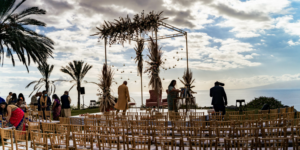
19 Tips For Planning A Destination Wedding
Destination weddings are a wonderful way to celebrate your big day in a unique and memorable way. Whether it be the place you first met,

Plan, enquiry & save on the go.


Plan, enquiry & save on the go.

Are you a supplier? Click here
Please sign into your account
Fields marked with an asterisk (*) are required.
Fields marked with an asterisk (*) are required.
You can share your Events with anyone you would like to be a part of your planning process. They must have an existing account to view the Event, and will need to archive any active Events on their account, in order to successfully share this Wedding.
By doing this, you will be deleting the event details. You will not be able to retrieve this. Are you sure you would like to continue?
Are you sure you would like to continue?
By doing this, you will be deleting this event details. You will not be able to retrieve this event data. Are you sure?
Are you sure you want to delete all the details for this guest - you will not be able to change the later.
If you would like to cancel your Membership, click below to ensure payments are no longer billed to your account. Your profile will remain active until the end of your current billing period.
Don’t leave, we will miss you!
If you would like to cancel your Membership, click below to ensure payments are no longer billed to your account. Your profile will remain active until the end of your current billing period.
Your Membership will override any existing features, if you choose to switch your plan.
This membership plan provides you with the following features:

By doing this, you will be deleting your Profile, Billing and Membership details. You will not be able to retrieve any account data. Are you sure?


20th June 2023

Written by Kirti Daryanani.
In celebration of Pride Month, I am inspired to shed light on the complexities surrounding conversations about queer marriages within South Asian communities.
As a heterosexual woman who has spent over 20 years working with diverse communities as a yoga teacher and advocate for LGBTQ+ rights, supporting the LGBTQ+ community is of utmost importance to me. However, I am also aware that there is not much support out there, especially when it comes to South Asian marriages in the LGBTQ+ community. My hope is that this article will provide a starting point for all couples.
I want to start by sharing one of my fondest memories while running a yoga center. The core value of our center was equanimity. Beyond the tapestry of our identity and labels, deeper than human connection, we would share a prayer known as the dedication of merit, reminding ourselves to treat all beings with true joy, compassion, and respect. It is a state of complete acceptance, deeper than equality. When considering what is important for a marriage, whether queer or otherwise, it is essential to extend this same principle to wedding celebrations. While it is easy for me as a straight individual to take certain things for granted, I wanted to research how weddings could be made more inclusive and meaningful.
Join us in celebrating Pride month, here at Eternity UK.
Please note
The spiritual scriptures of South Asia emphasize the values of equanimity and inclusivity. This article may challenge some individuals' views, and my hope is for an equanimous opportunity to support all beings. As it is crucial to remember that at the core of every marriage lies the sacred bond between two individuals who love themselves and each other.
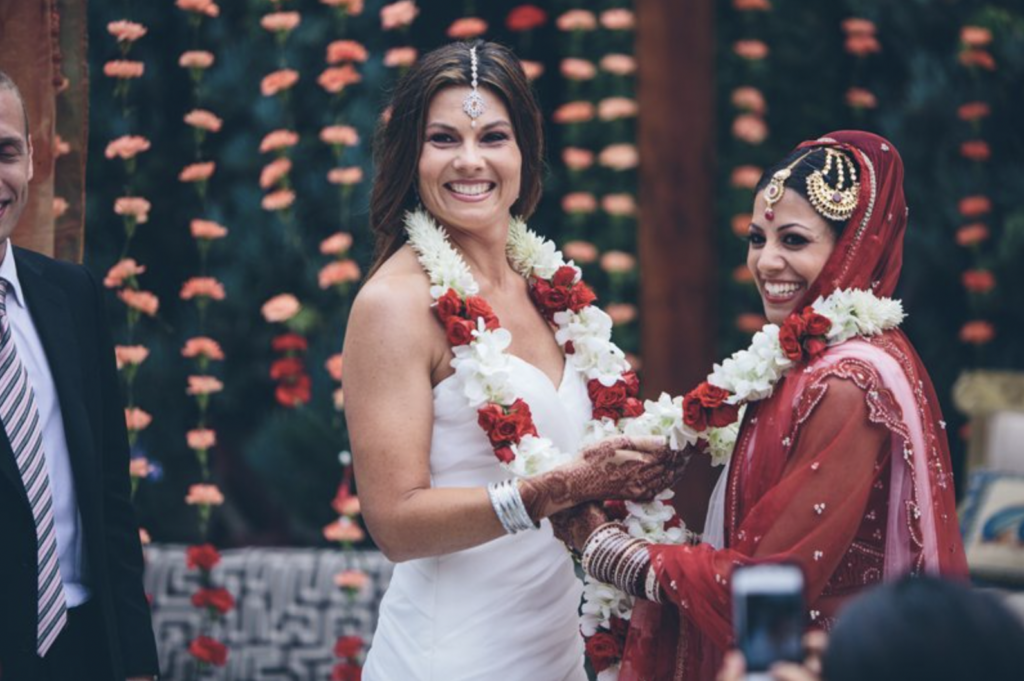
When we think of South Asian marriages, we envision joyous occasions where families gather to celebrate the love between individuals. Family involvement is high, and many rituals involve the participation of extended relatives. It’s truly a joyous moment, filled with laughter, dancing, endless hugging, but also with lots of ancient rituals. This can pose a challenge, when a marriage deviates from traditional norms, but it also presents an opportunity for creativity and inclusion across multiple generations.
There are three worthwhile conversations you want to have as a couple:
1 – Establish your wedding principles
It seems obvious, but have open and honest discussions as a couple: establish the what, who, when, and why. Connect with what is important to you as human beings, for each other, and how you want your wedding to be reflected. Discuss the rituals you want to include. Then have conversations with your respective close families and ask them what is important to them. Remember, your parents may have a whole list of “must-invite” guests for the wedding that may be non-negotiable, therefore, knowing what is important to the family as well, helps both of you to be clear about expectations and values to have the unexpected conversations that may arise.
2 – Reach out to the right priest
Choosing the right priest is crucial in how you experience your wedding. They perform the sacred rituals that will remind both of you of your sacred love for one another. Reach out to those who are familiar with conducting queer marriages and have a meeting to see if you feel safe and connected to the priest.
3 – Involve family members
Eventually, involve family members who are great at handling family politics. Every wedding has uncertainties, and occasionally emotions may run high. Having an ambassador in the family to manage certain conversations with difficult guests may help the couple remain calm and enjoy the celebrations. Involving respected community leaders, religious figures, or supportive elders can also help facilitate conversations and bridge gaps between generations. Their influence and guidance can help shift attitudes and open doors to acceptance within the community. Make a list of who you could consider to be the ambassadors.
These conversations should focus on the essence of the sacred union and the celebration of love, rather than getting caught up in labels and traditions.
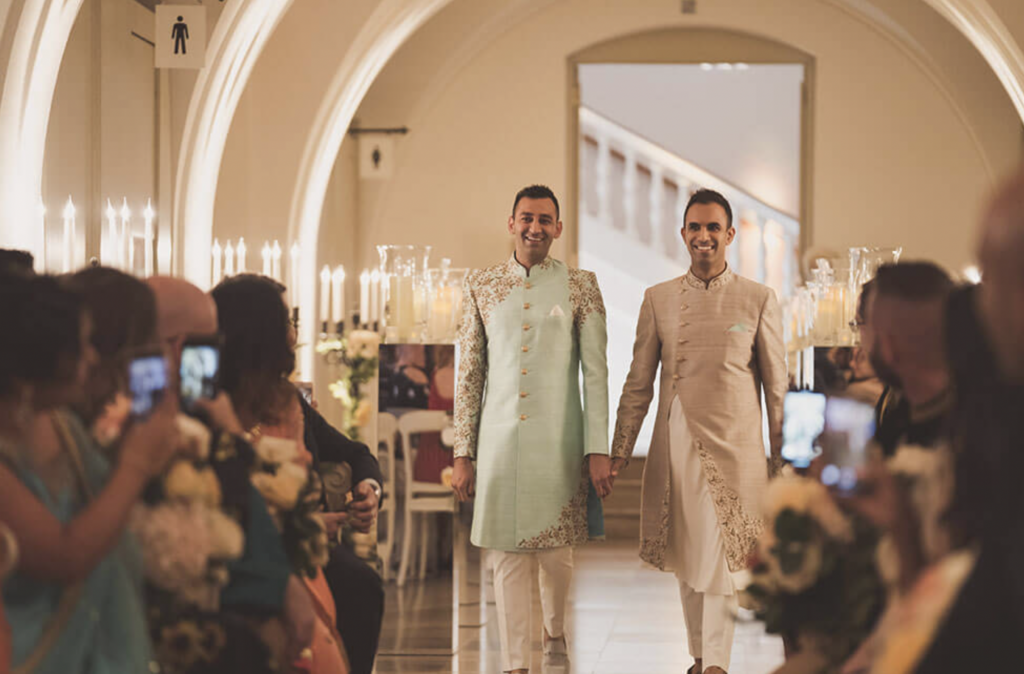
When it comes to wedding ceremonies, couples can work with pandits, priests, or religious leaders who are affirming and inclusive. Together, they can craft meaningful rituals that honour the love and commitment of the couple. This may involve adapting traditional rituals or incorporating new elements that reflect the couple’s identities and values. These religious leaders have a deep knowledge of South Asian scriptures, particularly ones that can enhance the sacredness of a marriage.
To illustrate the importance of incorporating inclusive practices into South Asian weddings, let us draw upon the wisdom of the scriptures:
The Rig Veda from Hinduism
emphasizes the unity of mind and purpose, highlighting the need for love and companionship to merge hearts and souls.
The Zoroastrian Wedding Blessing
emphasizes equality, respect, and shared aspirations as the foundation of a successful union.
The Guru Granth Sahib from Sikhism
encourages harmony and balance in sacred unions, radiating love and acceptance to inspire others.
Tirukkural, a Tamil literature,
speaks of love transcending societal norms and emphasizes the beauty of equality and unity.
Sufi Poetry from Islam reminds
us that love dissolves gender boundaries, and the power of love is boundless and liberating.
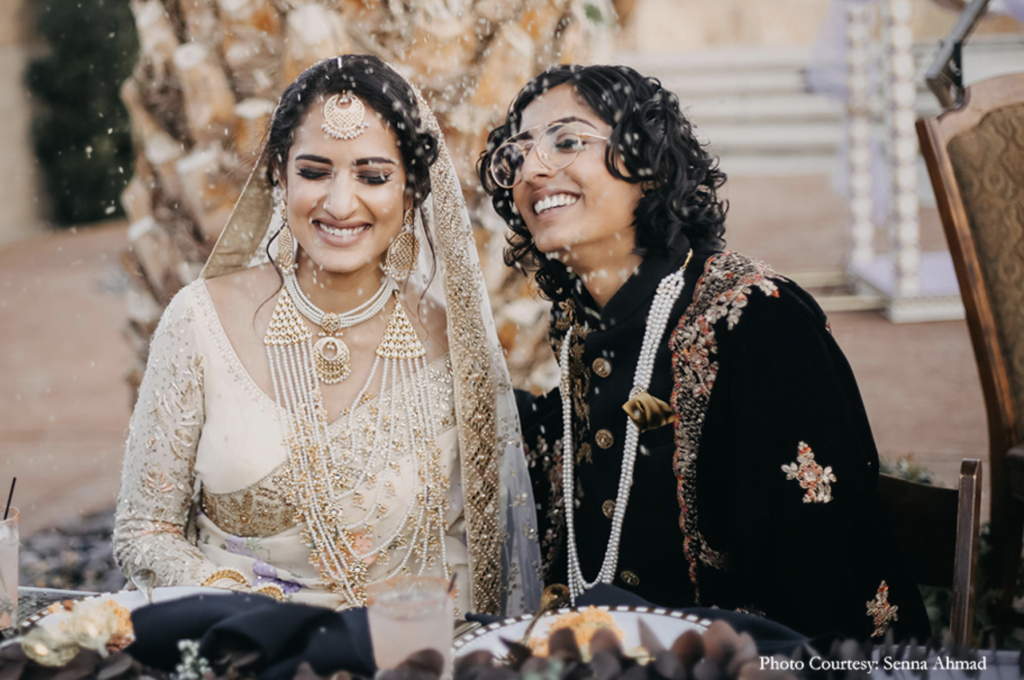
Together with the priest, couples can discover such beautiful scriptures to serve as guiding principles for wedding vows, allowing couples in queer marriages to celebrate their love and commitment in a way that reflects their unique journey, whilst honouring the spiritual wisdom of South Asian traditions. Their guidance can create a sense of equanimity and togetherness.
To ensure I did not overlook any important elements, I had the opportunity to interview individuals who have experienced the journey of coming out and navigating queer identities within South Asian communities. They shared insights on making weddings even more joyous. One individual I interviewed is Radha, who identifies as lesbian and non-binary. Radha highlighted the importance of having conversations that focus on emotions and experiences rather than getting caught up in labels.
These conversations can create deeper understanding and acceptance within families. However, it is crucial to bear in mind that many Asian families struggle with discussing emotions and challenges. It takes time to prepare the environment to feel safe and supportive for the different generations or bring in the family ambassador to facilitate conversations, especially when it comes to rituals and changing them in the wedding. Taking time to prepare for these discussions and considering how family members may react can help couples feel more prepared and facilitate smoother conversations.
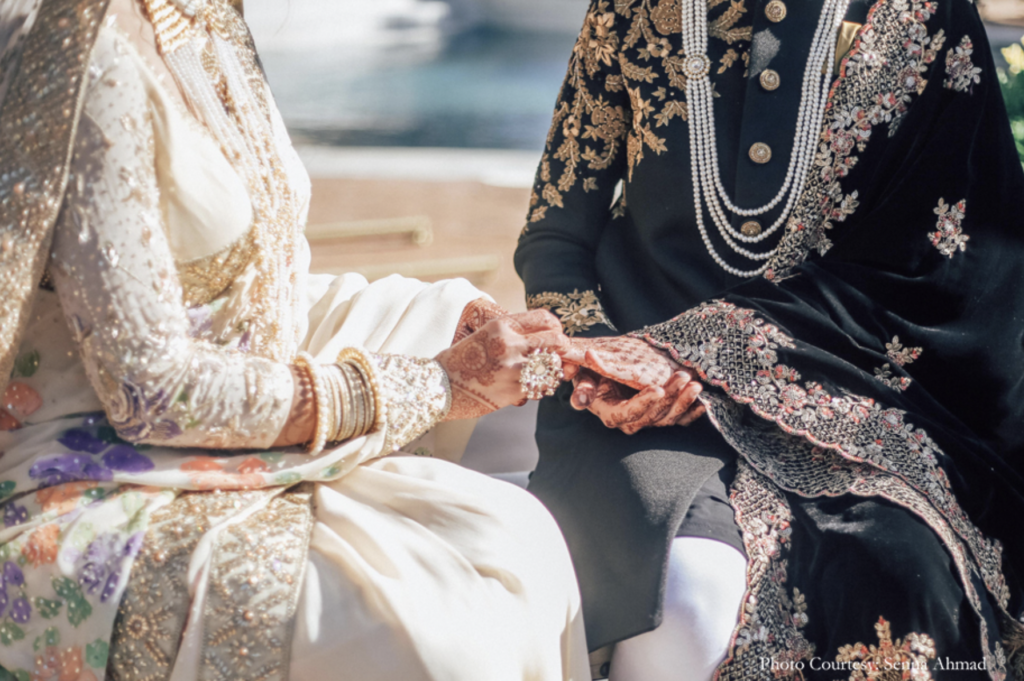
Asian weddings are known for their glamour and colourful celebrations. When creating a theme for the different events, it is essential to find the right balance between preserving the significance of traditions and allowing individuals to express themselves authentically. Couples can take the opportunity to explore different ideas together and prioritise what is important to each other.
Radha shared with me the concept of “queering” traditions, which means infusing traditions with their unique values and identities.
For example, the tradition of Mehndi, traditionally associated with women, can be expanded to include anyone who feels a connection to it.
After discussing with your partner, think about turning your values into motifs, words, and symbols that can be included in the Mehndi ceremonies. In my family’s weddings, we had a fun tradition where the male’s name was hidden in the Mehndi design, and only he could have physical contact to reveal it. In queer marriages, you can add much fun and creativity by having a playful game in applying the sacred ritual of mehndi to reflect the love that binds both partners.
Other traditions such as the Tilak ceremony or Baraat can also be adapted beyond gender, and understanding their significance and then adapting the celebrations, to be shared and discussed with your event planner.
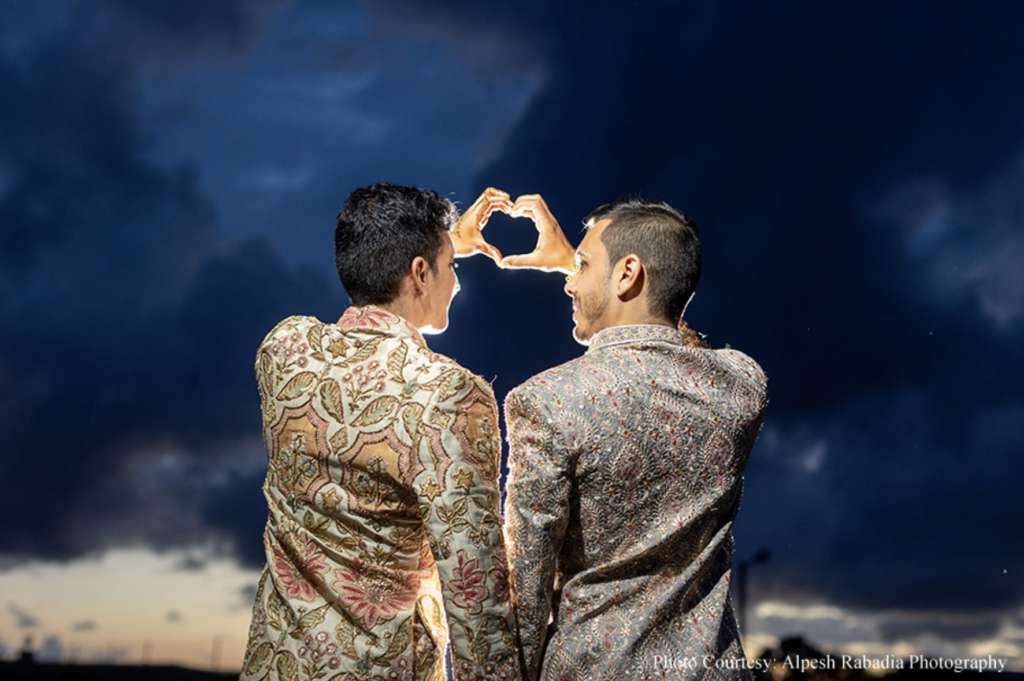
Ideally, it’s a member who is calm and level-headed to navigate the challenges and emotions during the wedding. While open and honest communication is necessary, during weddings when emotions are high, this can be easily forgotten. A family ambassador mediates, but by making them official, it navigates the entire family to remain cool when struggles arise. Let them know why you asked this family to support you, as it’s important to approach these conversations with empathy and patience, recognizing that it may take time for some family members to fully comprehend and accept queer marriages within South Asian traditions.
This family ambassador can share personal stories and experiences to help create an emotional connection and break down stereotypes or misconceptions.
Most of all, they can explain to the different generations how the new rituals will be implemented during the wedding, so that the wedding can run smoothly.
Couples and families should aim to enjoy this time to the fullest. Embracing queer marriages within South Asian wedding traditions requires a commitment to love, equanimity, and understanding. By honoring the sacred bond between two individuals and adapting traditions to be more inclusive, we can create spaces where queer individuals can authentically celebrate their love while maintaining the beauty of traditions and fostering acceptance within their families and communities, making it an unforgettable wedding.
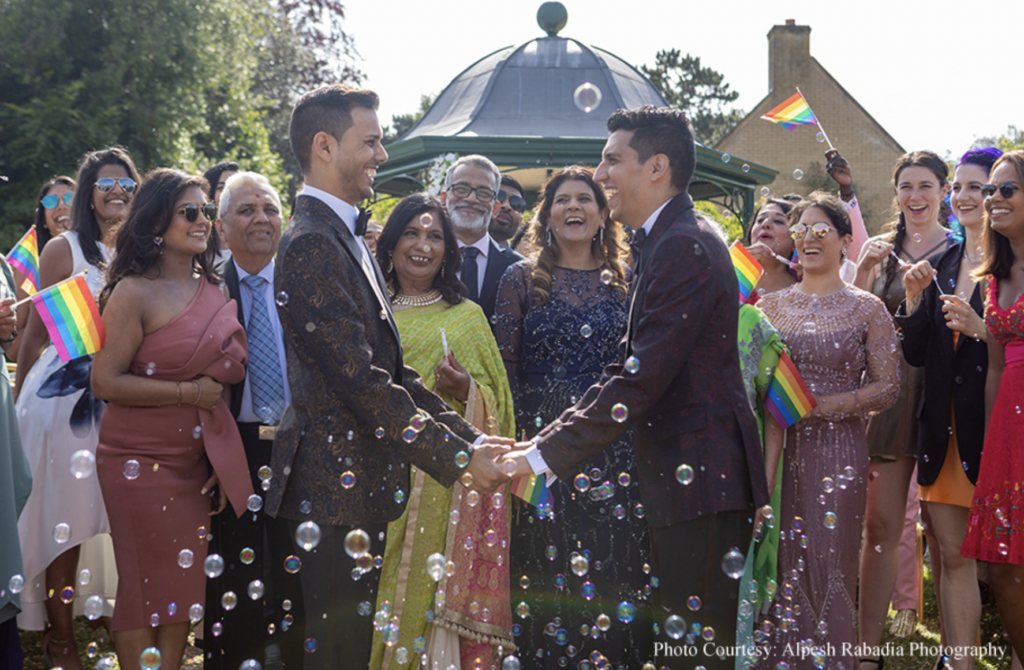
Need an ear and some guidance on how to modernize minds for meaningful relationships?
Struggling to speak your mind? Contact me, Kirti, at kirti@kirtana168.com or follow me on Instagram: @kirtana168.

Destination weddings are a wonderful way to celebrate your big day in a unique and memorable way. Whether it be the place you first met,
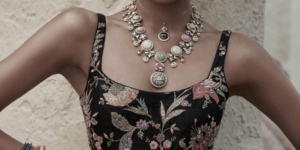
As one of the most sought-after Indian fashion designers, Sabyasachi Mukherjee has once again outdone himself with his latest collection for 2023. This collection showcases
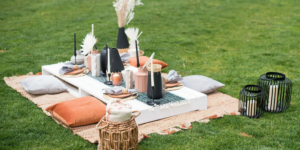
After you get engaged, your life will likely become engulfed by wedding planning! So much so, that it’s very easy to get overwhelmed by wedding
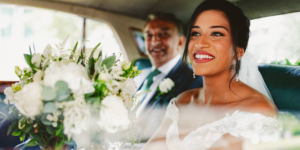
In a world where love knows no boundaries and cultures intertwine, there exists an art form that beautifully captures these moments of unity, joy, and
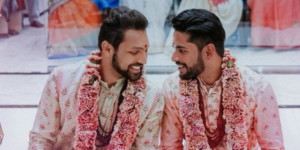
Check out our top tips on how to be an ally for your LGBTQ+ wedding clients. Celebrate Pride with Eternity UK.
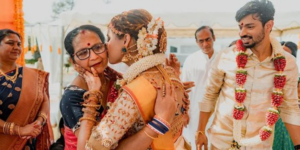
South Asian weddings are so fun. The music, the celebration, the colours, the love: it’s all incredible. Every single element of a wedding ritual &

It is instilled into us, that our wedding day has to be the most perfect day. The sun should be shining, the birds chirping, our
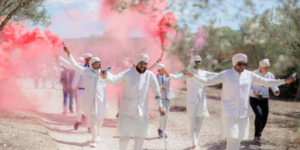
Congratulations on your engagement! Let the wed-min begin. Are you wonderful where to start with your wedding planning? Well, you’ve come to the right place,

After dreaming of the most perfect wedding, a girl often get’s excited for planning the most incredible hen party with her best bride squad. If
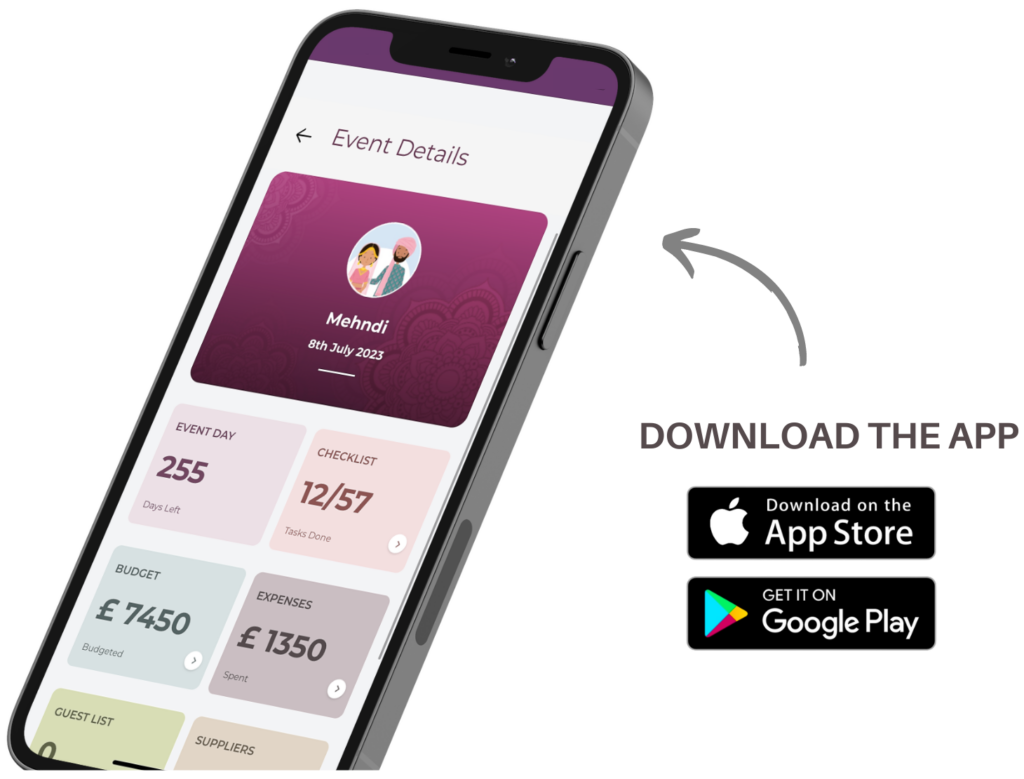

Sign In with
Or sign up here